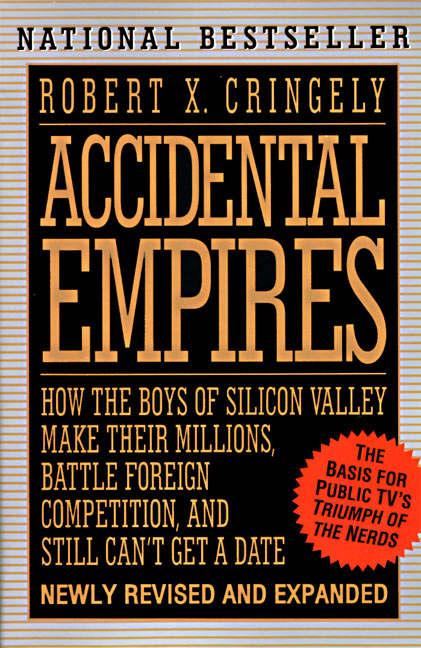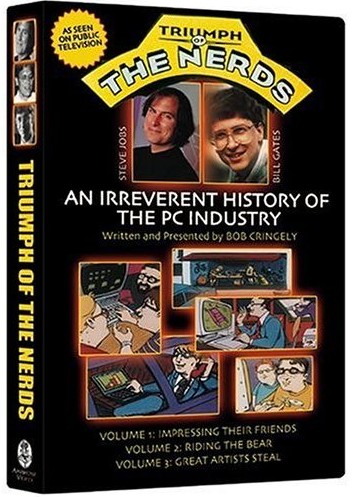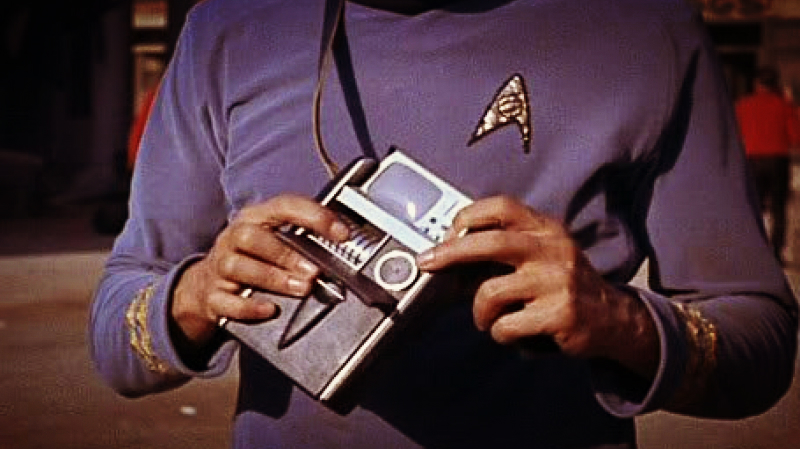
Accidental Empires Part 4 -- The Demo-God (Chapter 1a)
Fourth in a series. Editor, with one, two, three introductions behind, Robert X. Cringely's serialized version of 1991 classic Accidental Empires begins.
Years ago, when you were a kid and I was a kid, something changed in America. One moment we were players of baseball, voters, readers of books, makers of dinner, arguers. And a second later, and for every other second since then, we were all just shoppers.

Accidental Empires Part 3 -- 1991 edition preface
Third in a series. Editor: In parts 1 and 2 of this serialization, Robert X. Cringely presents an updated intro to his landmark rise-of-Silicon Valley book Accidental Empires. Here he presents the original preface from the first edition.
The woman of my dreams once landed a job as the girls’ English teacher at the Hebrew Institute of Santa Clara. Despite the fact that it was a very small operation, her students (about eight of them) decided to produce a school newspaper, which they generally filled with gossipy stories about each other. The premiere issue was printed on good stock with lots of extra copies for grandparents and for interested bystanders like me.

Accidental Empires Part 2 -- 1996 edition preface
Second in a series. Editor: Robert X. Cringely is serializing his classic Accidental Empires , yesterday with a modern intro and today with the two past ones. The second edition of the book coincided with release of documentary "Triumph of the Nerds". The intros provide insight into a past we take for granted that was future in the making then. Consider that in 1996, Microsoft had a hit with Windows 95 and Apple was near bankruptcy.
The first edition of Accidental Empires missed something pretty important -- the Internet. Of course there wasn’t much of a commercial Internet in 1990. So I addressed it somewhat with the 1996 revised edition, the preface of which is below. Later today we’ll go on to the original preface from 1990.

Accidental Empires Part 1 -- an accidental story in the making
First in a series. February, 2013 -- We stand today near the beginning of the post-PC era. Tablets and smart phones are replacing desktops and notebooks. Clouds are replacing clusters. We’re more dependent than ever on big computer rooms only this time we not only don’t own them, we don’t even know where they are. Three years from now we’ll barely recognize the computing landscape that was built on personal computers. So if we’re going to keep an accurate chronicle of that era, we’d better get to work right now, before we forget how it really happened.
Oddly enough, I predicted all of this almost 25 years ago as you’ll see if you choose to share this journey and read on. But it almost didn’t happen. In fact I wish it had never happened at all…

These are the good old days
Yesterday was my 60th birthday. When I came to Silicon Valley I was 24. It feels at times like my adult life has paralleled the growth and maturation of the Valley. When I came here there were still orchards. You could buy cherries, fresh from the fields, right on El Camino Real in Sunnyvale. Apricot orchards surrounded Reid-Hillview Airport in San Jose, where I flew in those early days because hangars were already too expensive in Palo Alto. My first Palo Alto apartment rented for $142 per month, and I bought my first house there for $47,000. I first met Intel co-founder Bob Noyce when we were both standing in line at Wells Fargo Bank.
Those days are gone. But that is not to say that these days are worse.

Defy the law in protest and publicly unlock your smartphone
… Milo carefully said nothing when Major —— de Coverley stepped into the mess hall with his fierce and austere dignity the day he returned and found his way blocked by a wall of officers waiting in line to sign loyalty oaths. At the far end of the food counter, a group of men who had arrived earlier were pledging allegiance to the flag, with trays of food balanced in one hand, in order to be allowed to take seats at the table. Already at the tables, a group that had arrived still earlier was singing “The Star-Spangled Banner” in order that they might use the salt and pepper and ketchup there. The hubub began to subside slowly as Major —— de Coverley paused in the doorway with a frown of puzzled disapproval, as though viewing something bizarre. He started forward in a straight line, and the wall of officers before him parted like the Red Sea. Glancing neither left nor right, he strode indomitably up to the steam counter and, in a clear, full-bodied voice that was gruff with age and resonant with ancient eminence and authority, said:
"Gimme eat".

Do you think that all smart people actually work at Nokia, Qualcomm, and the X-Prize Foundation?
Third in a series. This is my response to the message from Qualcomm Tricorder X-Prize director Mark Winter, who said my objections to his contest design were without merit.
Let me make a point here: this isn’t about me receiving $10 million. We all know that’s not going to happen. It’s about designing a contest that actually encourages innovation. Please read on as I explain.

X-Prize Foundation answers my tricorder competition complaints
Second in a series. This message from the X-Prize Foundation is in response to the letter I sent Qualcomm's CEO.
They seem to feel the contest is fine as-is and my objections are without merit.

There's something missing from Qualcomm's Tricorder contest
First in a series. I wrote a letter to Qualcomm CEO Paul Jacobs. This went out January 11th and was delivered on the morning of the 14th.
The response will be my next post.

To get ahead, Apple must leave Steve Jobs behind
Second in a series. My last column looked at Apple’s immediate challenges in the iPhone business, while this one looks at the company’s mid-to-long term prospects and how best to face them. The underlying question is whether Apple has peaked as a company, but I think the more proper way to put it is how must Apple change in order to continue to grow?
Even as some analysts are downgrading Apple based on reported cancellation of component orders, saner heads have been crunching the numbers and realized that Apple still has a heck of an iPhone business. So if you are a trader I think you can be sure Apple shares will shortly recover, making this a buying opportunity for the stock.

iPhone Mini will be evolutionary, not revolutionary
First in a series. Has Apple peaked? Yes and no. I think the company still struggles somewhat to find its path following the death of former CEO Steve Jobs. But there’s still plenty happening and room for growth in Cupertino. So let’s start a discussion about what’s really going on there. I thought this might be possible in a single column, but looking down I see that’s impossible, so expect a second forward-looking Apple column.
The catalyst for this particular column is word coming over the weekend from the Wall $treet Journal that Apple is cutting back component orders for the iPhone 5, signaling lower sales than expected. I’m not saying this story is wrong but I don’t completely buy it for a couple reasons.

To say Windows will be at the center of U.S. military action is wishful thinking
The U.S. government, which usually is very slow to adopt new technologies, signed an agreement to move much of the Department of Defense to Windows 8. The three-year, $617 million deal for up to two million seats is a good proxy for where American business users are headed. Or is it? Microsoft of course hopes it is, but I think that’s far from a sure thing.
This isn’t just trading Windows XP for Windows 8. The U.S. Navy, which isn’t (yet) included in this deal, only recently signed its own agreement with Microsoft to take the fleet to Windows 7. But Windows 8, being touch-enabled and running all the way from smartphones to super-clusters, is something more. It represents the U.S. government’s best guess as to how it will embrace mobile.

The trick to stealing Hollywood is...
Third in a series. Some readers of my last column in this series seem to think it was just about the movie business but it wasn’t. It was about the recorded entertainment industry, which includes movies, broadcast and cable television, video games, and derivative works. It’s just that the movie business, like the mainframe computer business, learned these lessons first and so offers fine examples.
Whether from Silicon Valley or Seattle, technology companies see video entertainment as a rich market to be absorbed. How can Hollywood resist? The tech companies have all the money. Between them Amazon, Apple, Google, Intel and Microsoft have $300 billion in cash and no debt -- enough capital to buy anything. Apple all by itself could buy the entire entertainment industry, though antitrust laws might interfere.

Hollywood can’t help but take advantage of tech companies
Second in a series. A friend of mine who is a securities lawyer in New York worked on the 1985 sale of 20th Century Fox by Marvin Davis to Rupert Murdoch. He led a group of New York attorneys to Los Angeles where they spent weeks going over contracts for many Fox films. What they found was that with few exceptions there were no contracts. There were signed letters of intent (agreements to agree) for pictures budgeted at $20-$50 million but almost no actual contracts. Effectively business was being done, movies were being made, and huge sums of money were being transferred on a handshake. That’s how Hollywood tends to do business and it doesn’t go down very well with outsiders, so they for the most part remain outside.
Jump to this week’s evolving story about Intel supposedly entering with a bang the TV set-top box business replete with previously unlicensed cable content -- an Over-The-Top virtual cable system. This was expected to be announced, I’m told, at next week’s Consumer Electronics Show in Las Vegas.

Get ready for the Google ToiletSense algorithm
This may seem like a distraction from my theme of Silicon Valley and Hollywood, but please stick with me for a moment as we consider the fate of Blake Krikorian, who is best known for the Slingbox and now seems to be selling his current company, the awkwardly named Id8 Group R2 Studios. I think Krikorian’s career arc and our fascination with it give some insight into the whole tech-vs-Hollywood theme, showing how aimless and confused are some of these big technology companies.
The post I read that got me thinking in this direction came from Kara Swisher at allthingsd.com, which is part of the Wall Street Journal. Krikorian is reportedly selling his home automation startup to Amazon or Apple or Google or maybe Microsoft -- in other words the usual suspects. Amazon may be now out of contention because Krikorian just resigned from the Amazon board. But in any case, Swisher says, they all want Krikorian because "he is considered one of tech’s most savvy execs with regard to video and media distribution". Yeah, right.

